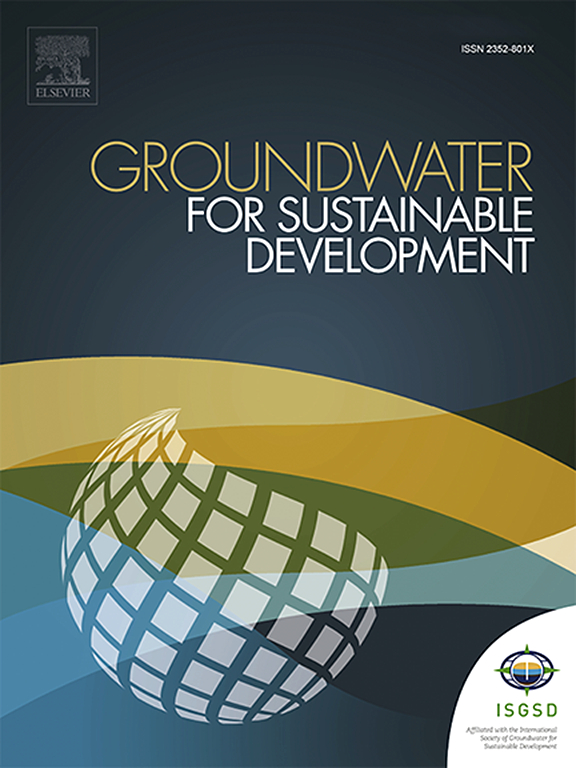Determining factors and strategy in sustainable fecal sludge management services
IF 4.9
Q2 ENGINEERING, ENVIRONMENTAL
引用次数: 0
Abstract
Currently, 65% of the total residents of Jakarta rely on groundwater as their primary water source for daily life. Groundwater quality is critical, with the presence of Escherichia coli bacteria throughout Jakarta significantly exceeding the limit. The solution to preventing groundwater pollution from fecal waste is through domestic wastewater management. On-site treatment is a solution to accelerate service achievement in Jakarta, but it has yet to be known which priority factors affect the sustainability of its services. This study aimed to determine the community's understanding of and interest in regular desludging services, the priority weights of sustainability factors for desludging services in Jakarta Province, and alternative sustainability strategies. The research and sampling in this study were conducted in Jakarta Province. Random sampling was conducted on 410 people. A hierarchical process analysis was conducted with 13 stakeholder respondents to determine the weight of the sustainability factors and the strategy to achieve sustainability of fecal sludge services. This study showed that 34.5% of Jakarta residents still rely on groundwater to meet their clean water needs through private and public wells. According to the regulations, 83% of people use septic tanks, but only 22% use desludging. To achieve sustainability of the fecal sludge service in Jakarta Province, the Leadership Factor has the highest priority, with a weight of 39%. The lowest priority was indicated by the technology factor, with a weight of 4.8%. An alternative strategy to achieve sustainability showed the highest priority weight of 82.6% for regular desludging services compared with on-call desludging. Regulations and sanctions support regular desludging. The role of leaders, both regional leaders and institutions, in committing to achieve service targets in a region is very important. Regular desludging services are recommended to ensure the sustainability of fecal sludge services in Jakarta Province.

确定可持续粪便污泥管理服务的因素和策略
目前,雅加达65%的居民依靠地下水作为他们日常生活的主要水源。地下水质量至关重要,整个雅加达存在的大肠杆菌明显超过了限值。防止粪便污染地下水的解决办法是通过家庭污水管理。现场治疗是加快雅加达服务成就的一种解决办法,但尚不清楚哪些优先因素影响其服务的可持续性。本研究旨在确定社区对定期除泥服务的理解和兴趣,雅加达省除泥服务可持续性因素的优先权重,以及可选的可持续性策略。本研究的研究和抽样在雅加达省进行。对410人进行了随机抽样。对13个利益相关者进行了层次过程分析,以确定可持续性因素的权重和实现粪便污泥服务可持续性的策略。这项研究表明,34.5%的雅加达居民仍然依靠地下水通过私人和公共水井来满足他们对清洁水的需求。根据规定,83%的人使用化粪池,但只有22%的人使用污泥。为了实现雅加达省粪便污泥服务的可持续性,领导因素具有最高的优先级,权重为39%。技术因素的优先度最低,权重为4.8%。实现可持续发展的另一种策略显示,与随叫随到的除泥服务相比,定期除泥服务的优先权重最高,为82.6%。法规和制裁支持定期除泥。区域领导人和机构在致力于实现区域服务目标方面的作用非常重要。建议定期提供除泥服务,以确保雅加达省粪便污泥服务的可持续性。
本文章由计算机程序翻译,如有差异,请以英文原文为准。
求助全文
约1分钟内获得全文
求助全文
来源期刊

Groundwater for Sustainable Development
Social Sciences-Geography, Planning and Development
CiteScore
11.50
自引率
10.20%
发文量
152
期刊介绍:
Groundwater for Sustainable Development is directed to different stakeholders and professionals, including government and non-governmental organizations, international funding agencies, universities, public water institutions, public health and other public/private sector professionals, and other relevant institutions. It is aimed at professionals, academics and students in the fields of disciplines such as: groundwater and its connection to surface hydrology and environment, soil sciences, engineering, ecology, microbiology, atmospheric sciences, analytical chemistry, hydro-engineering, water technology, environmental ethics, economics, public health, policy, as well as social sciences, legal disciplines, or any other area connected with water issues. The objectives of this journal are to facilitate: • The improvement of effective and sustainable management of water resources across the globe. • The improvement of human access to groundwater resources in adequate quantity and good quality. • The meeting of the increasing demand for drinking and irrigation water needed for food security to contribute to a social and economically sound human development. • The creation of a global inter- and multidisciplinary platform and forum to improve our understanding of groundwater resources and to advocate their effective and sustainable management and protection against contamination. • Interdisciplinary information exchange and to stimulate scientific research in the fields of groundwater related sciences and social and health sciences required to achieve the United Nations Millennium Development Goals for sustainable development.
 求助内容:
求助内容: 应助结果提醒方式:
应助结果提醒方式:


